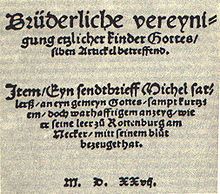Schleitheim Confession
This article includes a list of general references, but it lacks sufficient corresponding inline citations. (July 2009) |

The Schleitheim Confession was the most representative statement of Anabaptist principles, endorsed unanimously by a meeting of Swiss Anabaptists in 1527 in Schleitheim (Switzerland). The meeting was chaired by Michael Sattler. Michael Sattler was the leader of the Swiss and southern German Anabaptist movement. Shortly after the Schleitheim conference, Sattler was arrested by Austrian Roman Catholic authorities, and put on trial along with a number of other Anabaptists; he was found guilty[clarification needed] and was executed.[1] The South German Ordnung of approximately the same date is similar to that of the Schleitheim Confession but contains many more Biblical references supporting the confession.[2]: 191
The Confession consisted of seven articles, written during a time of severe persecution:
- Baptism
- Baptism is administered to those who have consciously repented and amended their lives and believe that Christ has died for their sins and who request it for themselves. Infants, therefore, were not to be baptized.
- The Ban (Excommunication)
- A Christian should live with discipline and walk in the way of righteousness. Those who slip and fall into sin should be admonished twice in secret, but the third offense should be openly disciplined and banned as a final recourse. This should always occur prior to the breaking of the bread.
- Breaking of Bread (Communion)
- Only those who have been baptized can take part in communion. Participation in Communion is a remembrance of Christ's body and blood; the real body and blood of Christ is not present in the sacrament.[3]
- Separation from Evil
- The community of Christians shall have no association with those who remain in disobedience and a spirit of rebellion against God. There can be no fellowship with the wicked in the world; there can be no participation in works, church services, meetings and civil affairs of those who live in contradiction to the commands of God (Catholics and Protestants). All evil must be resisted including their weapons of force such as the sword and armor.
- Pastors in the Church
- Pastors should be men of good repute. Some of the responsibilities they must faithfully carry out are teaching, disciplining, the ban, leading in prayer, and the sacraments. They are to be supported by the church, but must also be disciplined if they sin.
- The Sword (Christian pacifism) - nonresistance
- Violence must not be used in any circumstance. The way of nonviolence is patterned after the example of Christ who never exhibited violence in the face of persecution or as a punishment for sin. A Christian should not pass judgment in worldly disputes. It is not appropriate for a Christian to serve as a magistrate; a magistrate acts according to the rules of the world, not according to the rules of heaven; their weapons are worldly, but the weapons of a Christian are spiritual.
- The Oath
- No (oaths) should be taken because Jesus prohibited the taking of oaths and swearing. Testifying is not the same thing as swearing. When a person bears testimony, they are testifying about the present, whether it be good or evil.[4]
References
- ^ Christianity: A Social and Cultural History, Kee/Albu/Lindberg/Frost/Robert,Prentice Hall, Upper Saddle River, NJ, 1998.
- ^ Estep, William (1996). William B. Eerdmans (ed.). The Anabaptist Story: An Introduction to Sixteenth-Century Anabaptism. Cambridge, UK: Wm. B Eerdmans Publishing Co. ISBN 978-0-8028-0886-8. OCLC 000000.
- ^ "The Trial and Martyrdom of Michael Sattler (1527)", The Anabaptists, Janz.
- ^ "The Schleitheim Confession", Rod and Staff Publishers, Inc., Crockett, KY, 1985.
Further reading
- Meihuizen, H. W. (July 1967). "Who Were the False Brethren Mentioned in the Schleitheim Articles?". The Mennonite Quarterly Review. 41 (3): 200–22.
- Philips, Dietrich (October 1945). "The Schleitheim Confession of Faith". The Mennonite Quarterly Review. 19: 248.
- Snyder, C. Arnold (1984). The Life and Thought of Michael Sattler. Scottdale, Pennsylvania: Herald Press. ISBN 978-0-8361-1264-1. OCLC 10230672.[page needed]
- Snyder, C. Arnold (Winter 1985). "The Schleitheim Articles in Light of the Revolution of the Common Man: Continuation or Departure?". Sixteenth Century Journal. 16 (4): 419–430. doi:10.2307/2541218. JSTOR 2541218.
- Sattler, Michael (1973). John Howard Yoder (ed.). The Legacy of Michael Sattler. Scottdale, Pennsylvania: Herald Press. ISBN 978-0-8361-1187-3. OCLC 379353.[page needed]
External links
- Schleitheim Confession text
- Commentary on the Confession in Global Anabaptist Mennonite Encyclopedia Online
- Brüderlich vereinigung etlicher Kinder Gottes / sieben artikel betreffend The original text of the Schleitheim confession, with scanned images of the pages.
